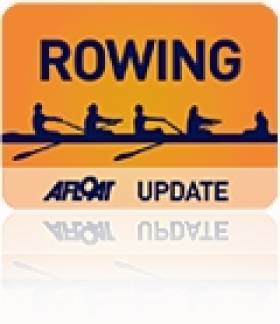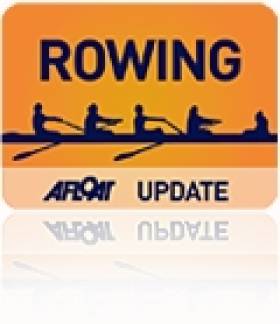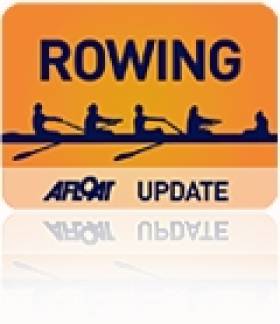Displaying items by tag: Universities
# ROWING: The Irish Universities Championships, which fell to the weather last month, have been rescheduled to Friday, May 24th, the eve of Metro Regatta, at Blessington. The event will run on a very pared-down version of the original programme. The Irish Schools’ Regatta becomes a separate event to be run on Friday, June 28th.
Hopes of rescheduling Skibbereen Regatta have faded due to the lack of a suitable date.
New Rowing Calendar Moves Irish Universities' Championships
# ROWING: The Irish Universities' Championships will be detached from the Irish Schools’ Championships and moved to a new date in June as part of the 2014 rowing calendar accepted by delegates at the Rowing Ireland agm in Dublin yesterday. The change has been prompted by Ireland Performance Director Morten Espersen, who also hopes to have the university athletes involved in a set programme of heads of the river and indoor rowing events.
Rowing Ireland Calendar 2014 (as approved by agm)
January 11th: Kerry Head of the River; 25th: Sligo Head.
February 1st: St Michael’s Head; 8th: Head of the Shannon, Carrick-on-Shannon; 15th: Lagan Head, Belfast; 22nd/23rd: Newry Trials.
March 1st: Erne Head, Enniskillen; 8th: Lagan Scullers’ Head, Belfast; 15th: Galway Head; 16th: Fermoy Head; 22nd: Dublin Head; 28th-30th: National Trials.
April 5th: Neptune Regatta, Islandbridge; 12th/13th: Skibbereen Regatta, National Rowing Centre; 19th: Trinity Regatta, Islandbridge; 26th: Limerick Regatta; 27th Schools’ Regatta, O’Brien’s Bridge.
May 3rd: Portadown Regatta; 10th: Bantry Regatta and Lough Rynn Regatta; 11th: Sligo Regatta; 17th: Queen’s Regatta, Castlewellan; 24th: Lee Regatta, Marina, Cork; 24th: Belfast Sprint Regatta.
June 1st: Carlow Regatta; 7th: Irish University Championships, Blessington; 8th: Dublin Metropolitan Regatta, Blessington; 14th: Athlone Regatta; 15th: Galway Regatta; 22nd: Castleconnell Sprint Regatta; 28th: Cork Regatta, NRC; 29th: Fermoy Sprints.
July 11th-13th: Irish Rowing Championships, NRC.
August: 3rd: Carrick-on-Shannon Sprints; 23rd: Belfast Summer Sprints.
September 13th: Interprovincial Sprints, Limerick; 20th: New Ross-Barrow Challenge. 27th/28th: National Trials, NRC.
October 4th: Tullamore Time Trial; 18th: Skibbereen Head, NRC.
November 1st: Castleconnell Head; 8th: Neptune Head, Blessington; 15th: Bann Head, Coleraine; 22nd/23rd: Regional Indoor Rowing Championships, Provincial Venues.
December 6th: Muckross Head, NRC. 13th: Irish Indoor Rowing Championships.
| CALENDAR 2014 - proposal for discussion / approval at 2013 AGM | ||||||||
|---|---|---|---|---|---|---|---|---|
| 2014 | DATE | EVENTS JAN - DEC 2014 | TYPE OF EVENT | STATUS | LENGTH | LANES | VENUE | PROVINCE |
| Sat | 04-Jan | |||||||
| Sun | 05-Jan | |||||||
| Sat | 11-Jan | Kerry HOR | Head | 4000 | Killorglin | Munster | ||
| Sun | 12-Jan | |||||||
| Sat | 18-Jan | |||||||
| Sun | 19-Jan | |||||||
| Sat | 25-Jan | Sligo HOR | Head | 4000 | Garavogue River Sligo | Connaught | ||
| Sun | 26-Jan | |||||||
| Sat | 01-Feb | St Michaels HOR | Rolling Head | 3500 | O'Briens Bridge | Munster | ||
| Sun | 02-Feb | |||||||
| Sat | 08-Feb | Head of the Shannon | Head | 5000 | Carrick on Shannon | Connaught | ||
| Sun | 09-Feb | |||||||
| Sat | 15-Feb | Lagan HOR | Head 1 Head 2 | 2800 4200 | River Lagan Belfast | Ulster | ||
| Sat | 15-Feb | Cork HOR | Head | 4000 | Marina Cork | Munster | ||
| Sun | 16-Feb | |||||||
| Sat | 22-Feb | Newry Trials | Trials | 5000 | Newry Canal | Ulster | ||
| Sun | 23-Feb | Newry Trials | Trials | 5000 | Newry Canal | Ulster | ||
| Sat | 01-Mar | Erne HOR | Head | 6000 | Enniskillen | Ulster | ||
| Sun | 02-Mar | |||||||
| Sat | 08-Mar | Lagan Scullers HOR | Head | 2800 | River Lagan Belfast | Ulster | ||
| Sun | 09-Mar | |||||||
| Sat | 15-Mar | Galway HOR | Head | 4300 | Galway | Connaught | ||
| Sun | 16-Mar | Fermoy HOR | Head | 4000 | River Blackwater | Munster | ||
| Sat | 22-Mar | Dublin HOR | Head | 3700 | Liffey | Leinster | ||
| Sun | 23-Mar | |||||||
| Fri | 28-Mar | Trials - Juniors / U23 / Seniors | Trials | National Rowing Centre Cork | Munster | |||
| Sat | 29-Mar | Trials - Juniors / U23 / Seniors | Trials | National Rowing Centre Cork | Munster | |||
| Sun | 30-Mar | Trials - Juniors / U23 / Seniors | Trials | National Rowing Centre Cork | Munster | |||
| Sat | 05-Apr | Neptune Regatta | Regatta - Grow the Sport | SEMI | 1400 | 2 | Islandbridge Dublin | Leinster |
| Sun | 06-Apr | |||||||
| Sat | 12-Apr | Skibbereen Regatta | Regatta - Grand League | FULL | 2000 | 8 | National Rowing Centre Cork | Munster |
| Sun | 13-Apr | Skibbereen Regatta | Regatta -Grand League | FULL | 2000 | 8 | National Rowing Centre Cork | Munster |
| Sat | 19-Apr | Trinity Regatta | Regatta - Grow the Sport | SEMI | 1800 | 2 | Islandbridge Dublin | Leinster |
| Sun | 20-Apr | Easter Sunday | ||||||
| Sat | 26-Apr | Limerick Regatta | Regatta - Multi-lane | FULL | 1500 | 4 | O'Briens Bridge | Munster |
| Sun | 27-Apr | Schools Regatta | Non | 1500 | 4 | O'Briens Bridge | Munster | |
| Sat | 03-May | Portadown Regatta | Regatta - Grow the Sport | SEMI | 1000 | 2 | Portadown | Ulster |
| Sun | 04-May | |||||||
| Sat | 10-May | Bantry Regatta/Lough Rynn | Regatta - Grow the Sport /ML | NON/FULL | 500/2000 | 3 | Bantry | Munster/Connaught |
| Sun | 11-May | Sligo Regatta | Regatta - Multi-lane | SEMI | 1000 | Sligo | Connaught | |
| Sat | 17-May | Queen's Regatta | Regatta - Grand League | FULL | 1500 | 6 | Castlewellan | Ulster |
| Sun | 18-May | |||||||
| Sat | 24-May | Lee Regatta | Regatta - Grow the Sport | NON | 500 | 6 | Marina Cork | Munster |
| Sat | 24-May | Belfast Sprint Regatta | Regatta - Grow the Sport | NON | 500 | 2 | River Lagan Belfast | Ulster |
| Sun | 25-May | |||||||
| Sat | 31-May | |||||||
| Sun | 01-Jun | Carlow Regatta | Regatta - Grow the Sport | SEMI | 1000 | 2 | Carlow | Leinster |
| Sat | 07-Jun | UNIVERSITY CHAMPIONSHIPS / ( NON Championship) | Regatta - Multi-lane | NON | 2000 | 6 | Blessington | Munster |
| Sun | 08-Jun | Dublin Metropolitan Regatta | Regatta - Grand League | FULL | 2000 | 6 | Blessington | Leinster |
| Sat | 14-Jun | Athlone Regatta | Regatta - Multi-lane | FULL | 1800 | 5 | Coosan Point Athlone | Connaught |
| Sun | 15-Jun | Galway Regatta | Regatta - Grow the Sport | SEMI | 700 | 3 | Galway | Connaught |
| Sat | 21-Jun | |||||||
| Sun | 22-Jun | Castleconnell Sprint Regatta | Regatta - Grow the Sport | NON | 500 | 5 | Castleconnell | Munster |
| Sat | 28-Jun | Cork Regatta | Regatta - Grand League | FULL | 2000 | 6 | National Rowing Centre Cork | Munster |
| Sun | 29-Jun | Fermoy Sprints | Regatta - Grow the Sport | NON | 500 | 3 | Fermoy | Munster |
| Sat | 05-Jul | |||||||
| Sun | 06-Jul | |||||||
| Fri | 11-Jul | Irish Rowing Championships | Championships | FULL | 2000 | 6 | National Rowing Centre Cork | Munster |
| Sat | 12-Jul | Irish Rowing Championships | Championships | FULL | 2000 | 6 | National Rowing Centre Cork | Munster |
| Sun | 13-Jul | Irish Rowing Championships | Championships | FULL | 2000 | 6 | National Rowing Centre Cork | Munster |
| Sat | 19-Jul | |||||||
| Sun | 20-Jul | |||||||
| Sat | 26-Jul | |||||||
| Sun | 27-Jul | |||||||
| Sat | 02-Aug | |||||||
| Sun | 03-Aug | Carrick-on-Shannon Sprints | Regatta - Grow the Sport | NON | 420 | 3 | Carrick on Shannon | Connaught |
| Sat | 09-Aug | |||||||
| Sun | 10-Aug | |||||||
| Sat | 16-Aug | |||||||
| Sun | 17-Aug | |||||||
| Sat | 23-Aug | Belfast Summer Sprints | Regatta - Grow the Sport | NON | 300 | 2 | River Lagan Belfast | Ulster |
| Sun | 24-Aug | |||||||
| Sat | 30-Aug | |||||||
| Sun | 31-Aug | |||||||
| Sat | 06-Sep | |||||||
| Sun | 07-Sep | |||||||
| Sat | 13-Sep | Interprovincial Sprints | Interprovincials | 500 | Limerick | Munster | ||
| Sun | 14-Sep | |||||||
| Sat | 20-Sep | New Ross - Barrow Challenge | Head | 18000 | River Barrow | Leinster | ||
| Sun | 21-Sep | |||||||
| Sat | 27-Sep | Trials - Juniors / U23 / Seniors | Trials | National Rowing Centre Cork | Munster | |||
| Sun | 28-Sep | Trials - Juniors / U23 / Seniors | Trials | National Rowing Centre Cork | Munster | |||
| Sat | 04-Oct | Tullamore Time Trial | Head | 2250 | Canal Offaly | Leinster | ||
| Sun | 05-Oct | |||||||
| Sat | 11-Oct | |||||||
| Sun | 12-Oct | |||||||
| Sat | 18-Oct | Skibbereen HOR | Head | 3000 | National Rowing Centre Cork | Munster | ||
| Sun | 19-Oct | |||||||
| Sat | 25-Oct | |||||||
| Sun | 26-Oct | |||||||
| Sat | 01-Nov | Castleconnell HOR | Head | 3000 | Castleconnell | Munster | ||
| Sun | 02-Nov | |||||||
| Sat | 08-Nov | Neptune HOR | Head | 4000 | Blessington | Leinster | ||
| Sun | 09-Nov | |||||||
| Sat | 15-Nov | Bann HOR | Head | 3000 | River Bann Coleraine | Ulster | ||
| Sun | 16-Nov | |||||||
| Sat | 22-Nov | Regional Indoor Rowing | 2k | Provincial Venues | each Province | |||
| Sun | 23-Nov | Championships | 2k | to be confirmed | each Province | |||
| Sat | 29-Nov | |||||||
| Sun | 30-Nov | |||||||
| Sat | 06-Dec | Muckross HOR | Head | 3000 | National Rowing Centre Cork | Munster | ||
| Sun | 07-Dec | |||||||
| Sat | 13-Dec | Irish Indoor Rowing Championships | ||||||
| Sun | 14-Dec | Irish Indoor Rowing Championships | ||||||
| Sat | 20-Dec | |||||||
| Sun | 21-Dec | |||||||
| Sat | 27-Dec | |||||||
| Sun | 28-Dec |
# ROWING: A decision will be made this afternoon on whether this weekend’s two big regattas at the National Rowing Centre will go ahead. The Skibbereen Regatta is fixed for Sunday and the Irish Universities and Schools’ Championships for Saturday, but both are in doubt because of the forecast of bad weather around the Co Cork venue.
































































